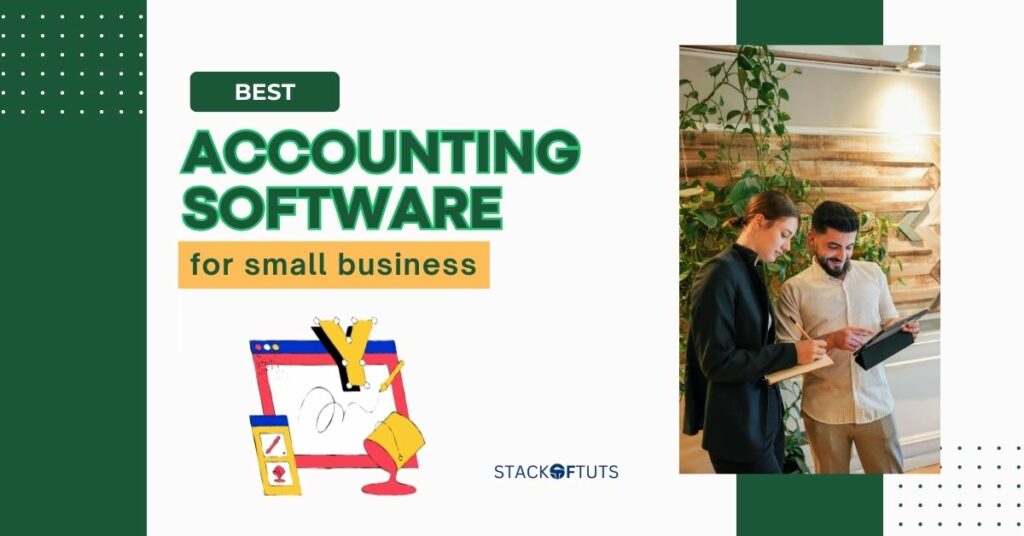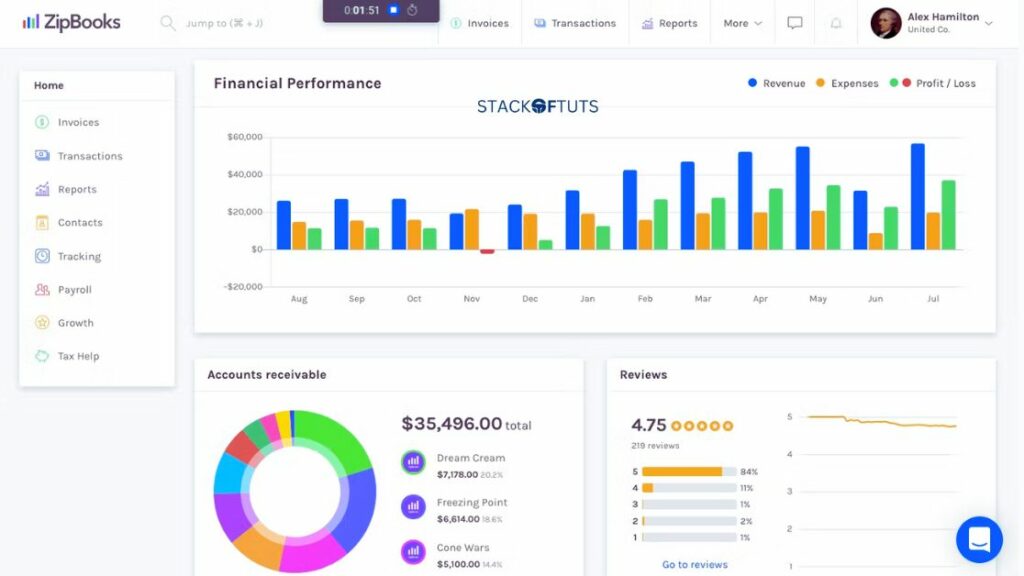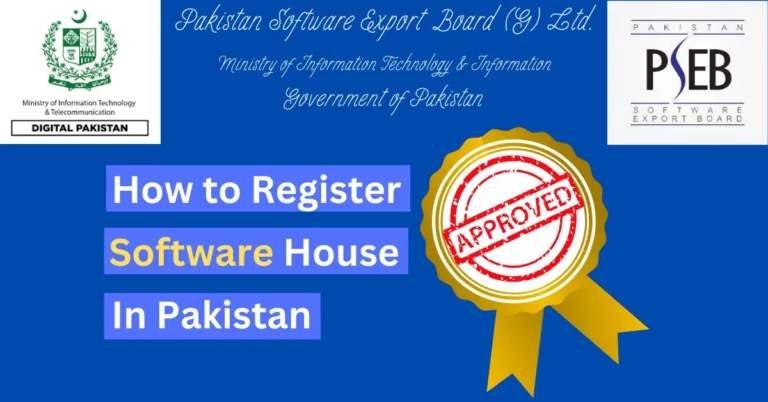
Finding the easiest accounting software for small businesses is not just a need in the fast-paced world of small enterprises; it’s a game-changer. With so many alternatives available, it might be difficult to choose the one that seamlessly corresponds with your company’s goals.
We go into the realm of user-friendly and effective accounting software in this article, highlighting leading candidates such as Wave, FreshBooks, Zoho Books, ZipBooks, and Xero. Our goal is to provide you with precise information so that you may make educated decisions that improve your organization’s financial management.
What is accounting software?
Accounting software automates accounting and transaction management for organizations, streamlining financial duties. These technologies make financial analysis and reporting easier by providing effective monitoring of revenue, spending, and invoices. They are necessary for precise financial decision-making and planning in businesses of all sizes. Businesses may improve their financial efficiency and accuracy, supporting development and compliance, by using accounting software.
Top 5 easiest accounting software for small businesses
- Wave
- FreshBooks
- Zoho Books
- ZipBooks
- Xero
Wave: Simplifying Accounting for Small Businesses

Wave provides a distinctive solution for small enterprises in search of a straightforward and economical alternative. It provides expense monitoring, financial reporting, and invoicing, among other complementary functionalities. This characteristic renders it an exceptional option, particularly for entrepreneurs lacking comprehensive expertise in finance or accounting. Wave’s intuitive and user-centric interface facilitates the streamlining of financial management processes for proprietors of businesses.
Key Features:
- Free to use: ideal for startups and small businesses on a tight budget.
- User-friendly dashboard: quick access to financial data and easy navigation.
- Integrated invoicing and payment solutions: streamline billing and payment processes.
FreshBooks: Customizable and Mobile-Friendly

FreshBooks caters to today’s company owners with its mobile-friendly interface and customizable invoicing. It is particularly well-liked by independent freelancers and service-oriented businesses because of its time-tracking capabilities and project management features.
Key Features:
- Customizable invoices: Add a personal touch to your billing.
- Time tracking: Monitor billable hours with ease.
- Collaborative features: ideal for teams and project-based businesses.
Zoho Books: Robust and Scalable

Zoho Books is a formidable competitor for companies seeking broad functionality and scalability. It is appropriate for expanding companies with more complicated demands since it provides everything from automated processes to inventory management.
Key Features:
- Comprehensive accounting tools: Manage every aspect of your finances.
- Automation: Save time with automated workflows and reminders.
- Integration capabilities: Seamlessly connect with other Zoho apps and third-party tools.
ZipBooks: Streamlined and Efficient

ZipBooks is renowned for its effectiveness and simplicity. For small company owners looking for a simple, no-frills accounting system, it’s a perfect option. Its straightforward design doesn’t take away from its potent features, which include informative reports and clear financial success measurements.
Key Features:
- Simplified interface: Focus on the essentials without the clutter.
- Smart reporting: Gain valuable insights into your financial health.
- Efficient expense management: Track and categorize expenses with ease.
Xero: Versatile and Collaborative

Xero’s versatility makes it a favorite among various types of businesses. It supports unlimited users, which is ideal for collaborative environments. Its strong emphasis on automation and integration with over 800 apps makes it a powerful tool for businesses looking to streamline their accounting processes.
Key Features:
- Cloud-based: Access your financial data from anywhere.
- Robust integration: Enhance functionality with numerous add-ons.
- Real-time financial reporting: Make informed decisions with up
Also read: Top 10 Accounting Software in Pakistan that you should know
Important Accounting Software Features for Small Companies in 2024
The effectiveness and financial management of small businesses depend greatly on the choice of accounting software. Here is a quick rundown of the essential characteristics for 2024:
- Scalability: Can the software grow with your business? Does it offer additional features or tiers you can upgrade to as your needs increase?
- Security: How secure is the software? Does it have strong encryption and data protection measures? This is especially important for businesses that handle sensitive financial information.
- Compliance: Does the software comply with relevant tax and accounting regulations in your region?
- Integrations: Does the software integrate with your other tools, such as your bank, CRM, or e-commerce platform? This can streamline your workflow and save you time.
- Reporting and analytics: Does the software provide insightful reports and analytics to help you understand your finances and make informed decisions?
- Ease of use: Does the software have a user-friendly interface that is easy to learn and navigate, even for those with limited accounting experience?
- Customer support: What kind of customer support does the software offer? Is it readily available and helpful?
- Cost: How much does the software cost? Consider the features you need and your budget to find the best value for money.
- Industry-specific needs: Do you need software with features tailored to your specific industry? Some software focuses on sectors like retail, construction, or professional services.
- Ease of data migration: Will you need to migrate data from your current system? Choose software that offers a smooth and painless migration process.
Key Features of Accounting Software for Small Businesses in 2024
Selecting the ideal accounting software is crucial for small business efficiency and financial management. Here’s a brief overview of the must-have features for 2024:
Core Accounting Capabilities:
- Invoicing and Billing: Streamline creating and managing invoices and payments.
- Expense Tracking: Easily record and categorize expenses to maintain budget control.
- Financial Reporting: Access comprehensive reports for a clear view of your business’s financial health.
- Bank Reconciliation: Simplify the matching of transactions with bank statements for accuracy.
- Accounts Management: Efficiently track payable and receivable accounts, along with automated reminders.
- Inventory Management (Optional): Ideal for product-oriented businesses to monitor stock levels.
User Experience and Accessibility:
- Simple Interface: Ensure the software is user-friendly, catering to those without an accounting background.
- Mobile Access (Optional): Manage finances on-the-go with a mobile application.
- Cloud-Based Access: Gain flexibility with online access to financial data from any location.
Automation for Efficiency:
- Automated Data Entry: Minimize errors with automatic bank statement imports.
- Recurring Billing: Set up automated billing for consistent transactions.
- Payment Integration: Simplify receiving online payments through the software.
- Tax Features (Optional): Automated tax calculations and filings for convenience.
Insights and Reporting:
- Detailed Dashboards: Visualize financial health with customizable reports.
- Profit/Loss Analysis: Understand revenue versus expenses for informed business decisions.
- Balance Sheet Access: Quick view of assets, liabilities, and equity.
- Cash Flow Tracking: Monitor cash inflows and outflows for financial stability.
- Custom Reports: Tailor reports to specific business needs for better insight.
Security and Regulatory Compliance:
- Data Protection: Ensure financial information is securely encrypted.
- User Permissions: Control access levels for data security.
- Regulation Adherence: Choose software compliant with local accounting standards.
FAQs
Firm size, industry, budget, and demands determine accounting software choices. Usability, scalability, interoperability, functionality (invoicing, expenditure monitoring, reporting), customer service, and price matter. Enterprise software should boost operations.
Yes, growing organizations use more complicated accounting software. System migration is easy with most software’s data export. Data continuity during migration is planned. Consult an IT or accounting specialist during the switchover.
Secure cloud accounting for banks. Multi-factor authentication, encryption, and security checks safeguard data. Review software compliance, internal security, and functionality.
Accounting abilities are essential; however, many small company accounting software programs are for non-accountants. Guided procedures, simple interfaces, and built-in assistance are typical. Some teach accounting novices.
Conclusion
Choosing the easiest accounting software for small businesses hinges on individual needs and budget constraints. Options range from free, straightforward software for basic needs to customizable, mobile-friendly solutions for on-the-go management. For growing businesses, scalability is key, while others may prioritize operational efficiency with streamlined platforms. Versatility is also crucial for some, requiring software that offers comprehensive features and seamless integration. Ultimately, the right choice simplifies financial management, ensures accuracy, saves time, and supports business growth.
Thanks!


![6 Steps: How to start a software house in Pakistan? [Guide in 2024]](https://www.stackoftuts.com/wp-content/uploads/2022/03/How-to-start-software-house-in-Pakistan-768x402.jpg)

